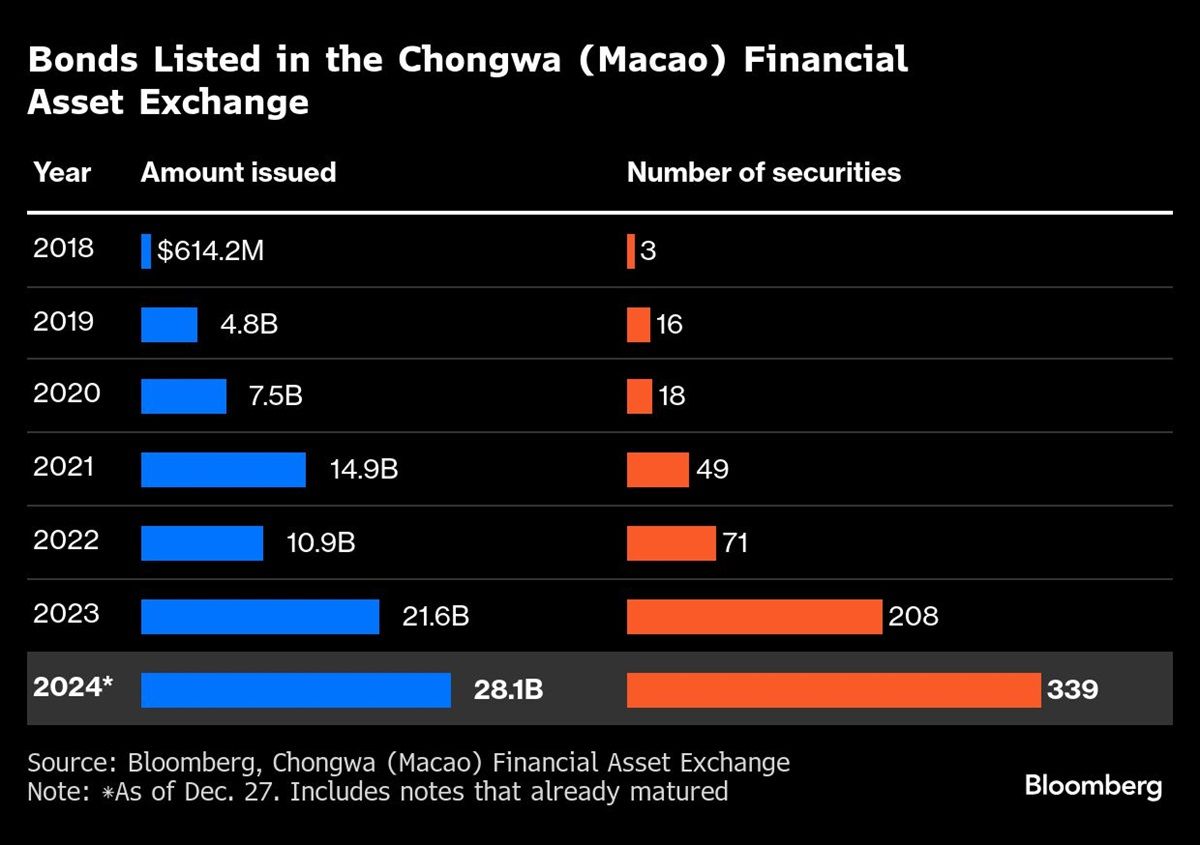
(Dec 30): Macau is hosting a record amount of bond listings, as the world’s top gambling hub boosts efforts to diversify its economy and establish itself as an alternative financing hub for Chinese firms.
A combined US$28.1 billion (RM125.58 billion) of bonds have started trading this year on the Chongwa (Macao) Financial Asset Exchange Co, Ltd, a local exchange known as MOX, according to Bloomberg-compiled data. Around 63% of these new notes are yuan-denominated and mostly issued by Chinese local government financing vehicles, or LGFVs.
The tally marks significant progress for MOX, where bond listings totalled slightly over US$600 million at its inception in 2018, thanks to Macau’s initiatives to make debt registration cheaper and simpler than at major Asian financial centres including Hong Kong and Singapore. The latest boom also has benefitted from a broader surge in offshore debt issuance by China’s LGFVs that face domestic borrowing restrictions.
“We are still at the nascent stage. We need to do a lot more to build up the pool of investors and issuers here,” Henrietta Lau, executive director of Monetary Authority of Macao, said in an interview. “Our aim is to build the bond market as a financing bridge between the mainland and the outside world.”
Prominent bond listings on MOX feature a two billion yuan (US$274 million) offering by China’s Ministry of Finance in 2019, the first of its kind in Macau, and a 2.2 billion yuan deal by the neighbouring province of Guangdong two years later. More recently, the bourse has become a popular venue for smaller listings of less than US$100 million by LGFVs, a group of debt-laden issuers that borrowed heavily during China’s previous infrastructure booms.
At the current level, Macau’s bond listings represent about 26% of Hong Kong’s, and up from about 3.8% in 2020, Bloomberg-compiled data show.
“The Chinese government intends to develop Macau into one of the key bond listing venues in Asia, especially for offshore CNY bonds and free trade zone bonds,” said Zerlina Zeng, head of East Asia corporate research at Creditsights Singapore LLC. “LGFVs and SOEs are as a result encouraged to help promote such initiatives.”
While the push for a stronger bond listing business is part of Macau’s efforts to reduce its excessive dependence on casinos, it remains a daunting task for the tiny former Portuguese colony.
The city has in recent years taken steps to boost its appeal as a bond trading centre, such as implementing a five-day registration process that’s shorter than the average time in Hong Kong. However, structuring, sales, clearing and settlement of debt offerings in many cases still occur outside of Macau. The lack of a dynamic secondary market is another hurdle.
In order to improve, local authorities have been working on a securities law that would provide more investor protection and help attract big debt issuers, such as Chinese policy banks and more provincial governments, Lau said. Separately, MOX has signed a strategic cooperation agreement with Luxembourg’s stock exchange, seeking to add Macau-listed bonds into the former’s (Luxembourg’s stock exchange’s) well-established trading platform.
Some of the Macau-listed bonds are also accessible on the Luxembourg bourse, thanks to a trading link between the two exchanges.
The city is also in talks with Deutsche Boerse AG’s Clearstream Banking SA and Euroclear Holding NV for further partnerships, Lau said. Meanwhile, most of the investors in Macau-listed bonds are institutional funds from mainland China, Hong Kong and Singapore, with little participation of the local casinos, she said, adding that fostering the latter as issuers and investors would be important.
For 2025, there’s optimism about growth in green and sustainable bonds, an MOX spokesman said in emailed response to Bloomberg’s queries. “As investors increasingly prioritise ESG (environmental, social, and governance) considerations, we anticipate a surge in demand for bonds that align with these values,” he said. Such notes carried a combined listed value of about 135 billion Macanese patacas (US$16.9 billion) as of November.
Uploaded by Liza Shireen Koshy

